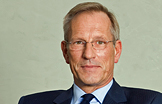Diekmann: It is not just a question of gender equality but an absolute necessity for us. The labor market will shrink as a result of demographic trends, and competition for talent will become increasingly fierce. Women make up over 50 percent of our workforce, but we are not yet making use of their skills at every level. Although 32 percent of our management positions globally are held by women, that figure is just 17 percent at the upper echelons of senior management and a mere 5 percent in top management. That is the average for Europe but falls far short of our expectations. And it can't satisfy us.
What have the measures to date achieved? The topic, after all, isn't a new one for Allianz.
Diekmann: Three years ago, we started with the specific promotion of women for top management positions. As a result, the participation of women in our group-wide development programs increased dramatically. In the case of potentials for middle management, for whom we offer the Allianz Management Program, the share of women rose from 24 percent in 2008 to 43 percent last year. In the Allianz Leadership Development Program, which grooms candidates for positions directly below board level, the share of women increased from 9 percent to 29 percent in the same period.
In 2008 we set ourselves the target of having at least 30 percent women in our group-wide talent pool for management positions by 2015. We will already achieve the 30 percent mark for middle management this year. With regard to the two top management levels, we expect to achieve this target in 2013 and 2015, respectively.
But obviously things aren't moving quickly enough in your opinion. So what next?
Diekmann: If you look at the composition of our executive committees, in Germany for example, you will see that it is still not enough. So we have decided to boost the number of women in leadership positions substantially at all subsidiaries by introducing other programs. In this endeavor the Board itself will be working with a relatively large group of successful women within Allianz on fundamental issues as well as individual topics.
In addition, we plan to elaborate working-time models for executives to create more flexibility and a better balance between family and career. In this respect we may be able to build on existing part-time models.
Isn't that discrimination against men?
Diekmann: No. What is clear is that positions at the upper management levels do not currently reflect the composition of our workforce. We have a lot to catch up with, and that is why we are specifically promoting women. The need for managers to also strike a better balance between family and career applies equally to women and men. We therefore want to offer our working-time models to both men and women. The prime achievement for us is the criterion of upward mobility in the company. That will not change in the future. But we must also ensure that we tap all sources of talent for our management.
What is your vision of the future?
Diekmann: I can certainly imagine women in positions on the Holding Board of Allianz SE, on the boards of our Group companies and on the supervisory boards. Until then we still have to pick up the pace with this issue. But I would also like to point out that for us as a global company this should be seen in the overall context of diversity. If you look at population statistics the importance of women is clear. Apart from that, however, it must also be our aim for instance to recruit an appropriate number of top managers for decision-making committees from the so-called markets of the future.
